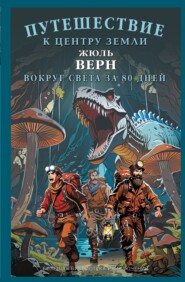По всем вопросам обращайтесь на: info@litportal.ru
(©) 2003-2024.
✖
From the Earth to the Moon, Direct in Ninety-Seven Hours and Twenty Minutes: and a Trip Round It
Настройки чтения
Размер шрифта
Высота строк
Поля
Barbicane observed with some interest that his guns and other arms had not been damaged. These were important, because, heavily loaded, they were to help to lessen the fall of the projectile, when drawn by the lunar attraction (after having passed the point of neutral attraction) on to the moon's surface; a fall which ought to be six times less rapid than it would have been on the earth's surface, thanks to the difference of bulk. The inspection ended with general satisfaction, when each returned to watch space through the side windows and the lower glass coverlid.
There was the same view. The whole extent of the celestial sphere swarmed with stars and constellations of wonderful purity, enough to drive an astronomer out of his mind! On one side the sun, like the mouth of a lighted oven, a dazzling disc without a halo, standing out on the dark background of the sky! On the other, the moon returning its fire by reflection, and apparently motionless in the midst of the starry world. Then, a large spot seemingly nailed to the firmament, bordered by a silvery cord: it was the earth! Here and there nebulous masses like large flakes of starry snow; and from the zenith to the nadir, an immense ring formed by an impalpable dust of stars, the "Milky Way," in the midst of which the sun ranks only as a star of the fourth magnitude. The observers could not take their eyes from this novel spectacle, of which no description could give an adequate idea. What reflections it suggested! What emotions hitherto unknown awoke in their souls! Barbicane wished to begin the relation of his journey while under its first impressions, and hour after hour took notes of all facts happening in the beginning of the enterprise. He wrote quietly, with his large square writing, in a businesslike style.
During this time Nicholl, the calculator, looked over the minutes of their passage, and worked out figures with unparalleled dexterity. Michel Ardan chatted first with Barbicane, who did not answer him, and then with Nicholl, who did not hear him, with Diana, who understood none of his theories, and lastly with himself, questioning and answering, going and coming, busy with a thousand details; at one time bent over the lower glass, at another roosting in the heights of the projectile, and always singing. In this microcosm he represented French loquacity and excitability, and we beg you to believe that they were well represented. The day, or rather (for the expression is not correct) the lapse of twelve hours, which forms a day upon earth, closed with a plentiful supper carefully prepared. No accident of any nature had yet happened to shake the travellers' confidence; so, full of hope, already sure of success, they slept peacefully, whilst the projectile under an uniformly decreasing speed was crossing the sky.
CHAPTER IV.
A LITTLE ALGEBRA
The night passed without incident. The word "night," however, is scarcely applicable.
The position of the projectile with regard to the sun did not change. Astronomically, it was daylight on the lower part, and night on the upper; so when during this narrative these words are used, they represent the lapse of time between the rising and setting of the sun upon the earth.
The travellers' sleep was rendered more peaceful by the projectile's excessive speed, for it seemed absolutely motionless. Not a motion betrayed its onward course through space. The rate of progress, however rapid it might be, cannot produce any sensible effect on the human frame when it takes place in a vacuum, or when the mass of air circulates with the body which is carried with it. What inhabitant of the earth perceives its speed, which, however, is at the rate of 68,000 miles per hour? Motion under such conditions is "felt" no more than repose; and when a body is in repose it will remain so as long as no strange force displaces it; if moving, it will not stop unless an obstacle comes in its way. This indifference to motion or repose is called inertia.
Barbicane and his companions might have believed themselves perfectly stationary, being shut up in the projectile; indeed, the effect would have been the same if they had been on the outside of it. Had it not been for the moon, which was increasing above them, they might have sworn that they were floating in complete stagnation.
That morning, the 3rd of December, the travellers were awakened by a joyous but unexpected noise; it was the crowing of a cock which sounded through the car. Michel Ardan, who was the first on his feet, climbed to the top of the projectile, and shutting a box, the lid of which was partly open, said in a low voice, "Will you hold your tongue? That creature will spoil my design!"
But Nicholl and Barbicane were awake.
"A cock!" said Nicholl.
"Why no, my friends," Michel answered quickly; "it was I who wished to awake you by this rural sound." So saying, he gave vent to a splendid cock-a-doodledoo, which would have done honour to the proudest of poultry-yards.
The two Americans could not help laughing.
"Fine talent that," said Nicholl, looking suspiciously at his companion.
"Yes," said Michel; "a joke in my country. It is very Gallic; they play the cock so in the best society."
Then turning the conversation, —
"Barbicane, do you know what I have been thinking of all night?"
"No," answered the president.
"Of our Cambridge friends. You have already remarked that I am an ignoramus in mathematical subjects; and it is impossible for me to find out how the savants of the Observatory were able to calculate what initiatory speed the projectile ought to have on leaving the Columbiad in order to attain the moon."
"You mean to say," replied Barbicane, "to attain that neutral point where the terrestrial and lunar attractions are equal; for, starting from that point, situated about nine-tenths of the distance travelled over, the projectile would simply fall upon the moon, on account of its weight."
"So be it," said Michel; "but, once more; how could they calculate the initiatory speed?"
"Nothing can be easier," replied Barbicane.
"And you knew how to make that calculation?" asked Michel Ardan.
"Perfectly. Nicholl and I would have made it, if the Observatory had not saved us the trouble."
"Very well, old Barbicane," replied Michel; "they might have cut off my head, beginning at my feet, before they could have made me solve that problem."
"Because you do not know algebra," answered Barbicane quietly.
"Ah, there you are, you eaters of x¹; you think you have said all when you have said 'Algebra.'"
"Michel," said Barbicane, "can you use a forge without a hammer, or plough without a ploughshare?"
"Hardly."
"Well, algebra is a tool, like the plough or the hammer, and a good tool to those who know how to use it."
"Seriously?"
"Quite seriously."
"And can you use that tool in my presence?"
"If it will interest you."
"And show me how they calculated the initiatory speed of our car?"
"Yes, my worthy friend; taking into consideration all the elements of the problem, the distance from the centre of the earth to the centre of the moon, of the radius of the earth, of its bulk, and of the bulk of the moon, I can tell exactly what ought to be the initiatory speed of the projectile, and that by a simple formula."
"Let us see."
"You shall see it; only I shall not give you the real course drawn by the projectile between the moon and the earth in considering their motion round the sun. No, I shall consider these two orbs as perfectly motionless, which will answer all our purpose."
"And why?"
"Because it will be trying to solve the problem called 'the problem of the three bodies,' for which the integral calculus is not yet far enough advanced."
"Then," said Michel Ardan, in his sly tone, "mathematics have not said their last word?"
"Certainly not," replied Barbicane.
"Well, perhaps the Selenites have carried the integral calculus farther than you have; and, by the bye, what is 'integral calculus?'"
"It is a calculation the converse of the differential," replied Barbicane seriously.
"Much obliged; it is all very clear, no doubt."
"And now," continued Barbicane, "a slip of paper and a bit of pencil, and before a half-hour is over I will have found the required formula."
Half an hour had not elapsed before Barbicane, raising his head, showed Michel Ardan a page covered with algebraical signs, in which the general formula for the solution was contained.
"Well, and does Nicholl understand what that means?"
"Of course, Michel," replied the captain. "All these signs, which seem cabalistic to you, form the plainest, the clearest, and the most logical language to those who know how to read it."

















